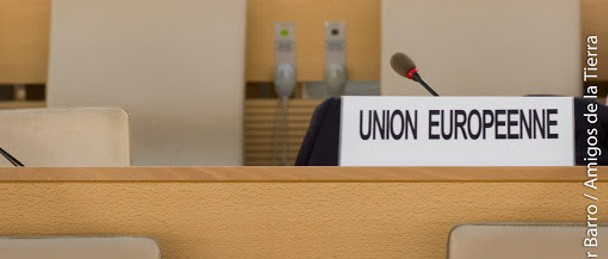TTIP and UN treaty: the EU must stand up for human rights

FIDH | 17 July 2015
Op-Ed: TTIP and UN Treaty - the EU must stand up for Human Rights
Human rights violations by companies happen on a daily basis and all too often go unpunished. Last week, discussions took place at the UN in Geneva to introduce international regulation holding businesses accountable for the damage they cause, and provide affected communities with access to justice. While the EU chose not to participate in these discussions, it has however engaged in another round of TTIP negotiations, closing this Friday. We are left questioning who the EU is really standing up for, its citizens or corporate profit ?
Human rights violations by companies happen on a daily basis and all too often go unpunished. Last week, discussions took place at the UN in Geneva to introduce international regulation holding businesses accountable for the damage they cause, and provide affected communities with access to justice. While the EU chose not to participate in these discussions, it has however engaged in another round of TTIP negotiations, closing this Friday. We are left questioning who the EU is really standing up for, its citizens or corporate profit ?
Despite public opposition - an online anti-TTIP petition has so far raised over 2.5 million signatures - the tenth round of negotiations on the controversial Transatlantic Trade and Investment Partnership, better known as TTIP, started this Monday in Brussels. The EU Commission is eagerly working with US representatives and corporate stakeholders in creating a deal that will benefit foreign investors and offer them the best possible protection, enforceable rights and remedies. This comes in striking contrast to the EU delegation’s interrupted engagement during last week’s discussions at the UN regarding an international instrument to regulate corporate behaviour and to help victims of corporate abuse seek justice when their rights are violated.
In fact, the first session of the United Nations Intergovernmental Working Group towards a binding Treaty on Transnational Corporations (TNCs) and other business enterprises with regards to human rights, which took place 6-10 July in Geneva, began with a European objection to the programme of work. The EU and few Member States present in the room asked for a broad interpretation of the Treaty’s mandate to include all businesses and not just TNCs. When, a day later, their proposal still found no support among other States, the EU block chose to retreat from the discussions.
The issue of scope enlargement asserted by the EU is supported by both civil society organisations and human rights experts. It is undeniable that while addressing the specific challenges posed by transboundary corporate activities, to avoid creating loopholes, the future Treaty must take into consideration corporate complexities and encompass all businesses, not just TNCs.
The predicament is that rather than raising its arguments constructively in a dedicated session, the EU chose to introduce them as preliminary conditions before the start of discussions. This led to a foreseeable delay in the proceedings, and was later used by the EU to step-out from the discussions. Looking back, it is hard not to wonder if the EU’s "take it or leave it" attitude was indeed a political faux pas, or a plan to derail discussions and create an exit strategy.
Adopting an ’empty chair’ policy in Geneva instead of engaging in a productive debate, next to the strong trans-institutional push for the Commission-backed TTIP, paints a grim picture of a Europe that puts corporate interest ahead of human rights and companies before people.
We are at a turning point and the European and world population’s future relies on ending irresponsible and unscrupulous business practices and ensuring access to justice on a national, regional and international level. The process of making human rights globally enforceable must become a priority for the EU and Member States. This can only be achieved through the development of comprehensive regulation establishing clear rules and effective accountability mechanisms rendering abuses a costly and risky business venture.
The EU must set itself apart from States like the US, Canada or Australia and prove it is not only claiming to be a human rights defender but actually is one, both at home and abroad. During the Geneva talks a consensus about the necessity of a binding instrument was reached among many participating States, experts and civil society. All parties agreed that developing transnational regulation is essential to addressing the legislative gaps which have left victims disarmed in their fight for justice. It would also be a mandatory step in rebalancing the power between host states and foreign investors, and assuring that people’s rights come before transnational agreements and private financial gain. The EU needs to engage constructively and in good faith in the Treaty process to deliver an historical advance for human rights and end corporate impunity.
Karim Lahidji
President, FIDH
Jerome Chaplier
Coordinator, European Coalition for Corporate Justice
Paul de Clerk
Coordinator, Friends of the Earth Europe Economic Justice Program





